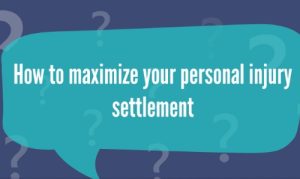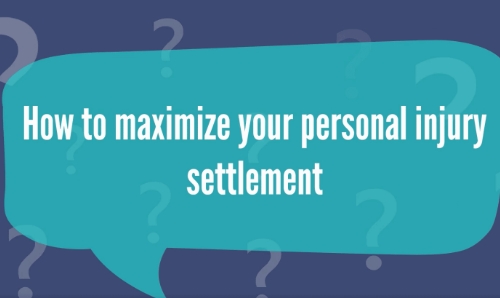How To Increase Settlement Value
If you’re thinking about filing a lawsuit, you’re probably wondering what kind of settlement you might get.
After all, a successful lawsuit can result in monetary compensation that can be used to cover medical bills, lost wages, and other expenses.
However, your settlement is not guaranteed, and the amount you receive will be determined by a number of factors.
In this blog, we’ll look at some strategies for increasing the value of your lawsuit settlement in the United States.
Whether you’re just starting to look into your options or you’re already in the middle of negotiating a settlement, these pointers will help you get the most money for your case.

How Is A Settlement Determined?
A settlement is determined through negotiation between the parties involved in the lawsuit, typically their lawyers.
The goal of these negotiations is to reach a mutually acceptable agreement that resolves the dispute and ends the lawsuit without the need for further court proceedings.
Factors that can influence the settlement amount include the strength of the evidence supporting each side’s position, the potential outcome of a trial, the cost and time of further legal proceedings, and the willingness of each party to compromise.
How to Maximize Your Lawsuit Settlement in USA
In order to get the most out of your lawsuit settlement in the United States, you will need to take a strategic approach and have a solid understanding of the variety of factors that can play a role in determining the outcome of your case.
Here’s How to Maximize Your Lawsuit Settlement in USA:
5 Cheap Small Business Insurance in 2023
Gather evidence and build a strong legal argument
One of the key steps in maximizing your lawsuit settlement is gathering evidence and building a strong legal argument.
This includes collecting documents, witness statements, and other types of proof that support your case. It’s important to present a well-organized and persuasive argument that clearly outlines your damages and the basis for your claim.
Additionally, it’s important to be familiar with the law and regulations related to your case and to have a solid understanding of the legal precedent that may apply.
A strong legal argument can increase your bargaining power in settlement negotiations and increase the likelihood of a favorable outcome.
File your personal injury claim as soon as possible
Another important step in maximizing your settlement is to file your personal injury claim as soon as possible.
In the United States, there are time limits for filing personal injury lawsuits, known as “statutes of limitations,” which vary by state.
If you miss the deadline, you may be barred from pursuing your claim, so take action as soon as possible.
By filing your claim as soon as possible, you will have more time to gather evidence and build a strong legal argument, increasing your chances of a favorable settlement.
Also, it’s important to go to the hospital right away after an accident so that you can get a record of your injuries and prove that they were caused by the accident.
Understand the different types of settlements.
In a personal injury case, you may be offered several different types of settlements.
Understanding the various types can help you make informed decisions and maximize your settlement.
The following are some of the most common types of settlements:
Lump Sum Settlement: A one-time payment is made to resolve the case.
Structured Settlement: Rather than a lump sum payment, this type of settlement involves regular payments over a set period of time.
Settlement Fund: A settlement fund is established when a large number of plaintiffs have similar claims and the defendant agrees to pay a set amount of money into a fund that will be used to pay settlements to each of the plaintiffs.
Alternative Dispute Resolution (ADR): This type of settlement involves mediation, arbitration, or another type of ADR process. These methods frequently result in faster and less costly settlements than traditional court proceedings.
Pretrial Settlement: This type of settlement is reached prior to the start of the trial, allowing the parties to avoid the cost and time of additional legal proceedings.
Consult with an attorney
Consult an experienced personal injury attorney to maximize your settlement. An attorney can help you understand the law, evaluate your case, and build a strong case.
They can also mediate and represent you in court. An attorney can advise you on how to proceed and explain your case’s strengths and weaknesses.
They can also explain your rights and compensation. You can improve your chances of a good settlement and protect your rights by hiring an attorney.
Be prepared to negotiate.
Being prepared for negotiations can maximize your settlement.
This means knowing your case’s facts and evidence, understanding your legal rights and your position’s strengths and weaknesses, and being willing to compromise.
Be realistic and open to mediation or arbitration. Being prepared to negotiate and working with an experienced attorney can increase your bargaining power and the likelihood of a favorable settlement.
Remember, the goal of negotiation is to reach a mutually agreeable agreement, so being ready to listen and consider the other party’s perspective can help.
Do not accept the first offer without review
It is extremely important that the initial settlement offer not be accepted without it first being carefully examined and taken into consideration.
It is important to carefully evaluate the terms of the offer and the amount of compensation that it provides because the initial offer is not always the best or final offer.
It is important that you speak with an experienced personal injury attorney before accepting any offer. This attorney will be able to assist you in understanding the offer and determining whether or not it is fair.
An attorney can not only assist you in negotiating a better settlement for yourself, but they can also represent your interests throughout the entire process of negotiating that settlement.
You are able to make an educated decision and maximize the amount of money you will receive from the settlement if you take the time to carefully examine the offer and consult an expert.
FAQS
Q: What should I ask for in a lawsuit settlement?
A: When negotiating a lawsuit settlement, consider all of your damages from the accident or incident.
Common compensation includes: Medical costs, Lost wages, Pain and grief, damage, Penalties, Unjust death
Q: What is the longest a settlement can take?
A: From the time the complaint is filed until the case is settled, it usually takes a year. Six months is also a possibility. Only in a small number of cases does it take two to three years to settle a personal injury case.
Q: Do lawyers get a percentage of settlement?
A: According to the American Bar Association (ABA), a contingency-fee lawyer takes one-third of your settlement at the end of your case.
Q: Can you speed up settlement?
A: If both parties agree, it is legal to change the settlement date. However, in practice, you are dealing with four parties: your bank, their bank, your solicitor, and their solicitor. You’d all have to agree to the new date.
Conclusion
In conclusion, US lawsuit settlements require strategy and legal knowledge.
You can increase your chances of a favorable settlement by gathering evidence, building a strong legal argument, negotiating with the other party, and using alternative dispute resolution methods.
Consult with an experienced personal injury attorney, negotiate, and carefully review settlement offers to protect your interests and increase your chances of receiving fair compensation.
Remember, every case is unique and the best course of action depends on the circumstances.




